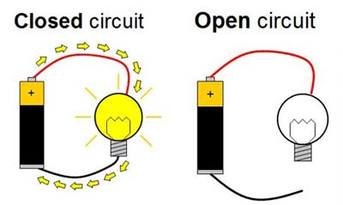
Electricians might refer to this as closing a circuit, so to speak. Whereas in an open circuit a power source connects to a light but doesn’t double back, a closed circuit returns to the source. The difference: closed circuit = uninterrupted flow of power, light bulbs going on, connection.
God, the power source, is always reaching us, animating us, powering our cells and consciousness with Divine thought; there is no other power source.
Question: If God the power source is always reaching us, what accounts for our feelings of confusion, stress, anger, etc?
Answer: God the power source.
As the sole supplier of all reality, including the energy that animates our consciousness, He's the source of our psychological experience - warm fuzzy and cold confused. The question is do we close the circuit of the flow or not.
When we hang our experience on things and circumstances of this world – as opposed to the One Source - we fail to close the circuit. When we attribute our experience back to the One Source, we close it.
This is to say that feeling warm and happy and clear minded is not inherently a sign of connection (i.e. good) nor that feeling lost demonstrates disconnect (i.e. bad). God can send us happy, peaceful thoughts and we think they come from our salary raise or vacation. That’s an open, non-flowing circuit. It feels nice in the moment but a) it’s a misunderstanding of reality and b) we won’t know where to look when it runs out.
Alternatively, God can send us distress and we acknowledge it as from Him. That’s a powerful, closed circuit. King David said, “From the narrow places I call to You.” It was obvious to David to call to God in his distress. Where else were the narrow places coming from but Him?
In short, real connection is not evidenced by feeling the way you want to feel. It’s about living in reality. It’s about sourcing your experience in its true source; being a truth seeker rather than a feeling seeker.
God will flow what He’ll flow; some of it will feel this way, some will feel that way. You will do your best with the understanding you have to make choices, be proactive, live your life. Sometimes you will remember this; sometimes you will forget. God rigged the system to support remembering. As you remember, your innate preference for connection will guide you and the body of work called your life will get richer, softer, deeper.
This is the essence of my second takeaway in the What Drives Change? Series: I don’t know how to manufacture – on command – divine understanding showing up in my words and actions. On the other hand, I see that the divine doesn’t have a problem finding me. And it's a great Yom Kippur segue.
On Yom Kippur we return (tshuva). The Source is on our side. Double back to the Source.

 RSS Feed
RSS Feed